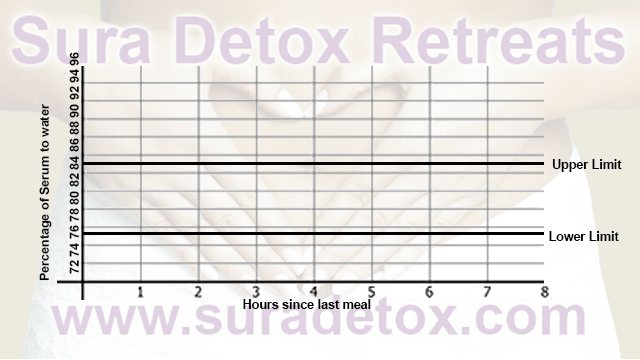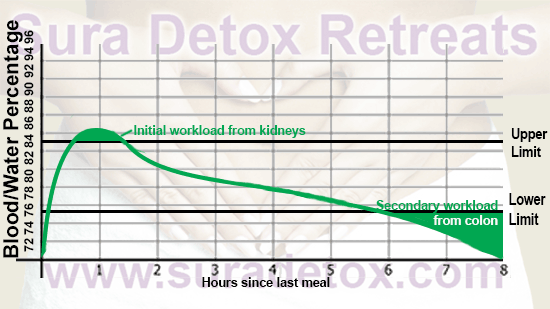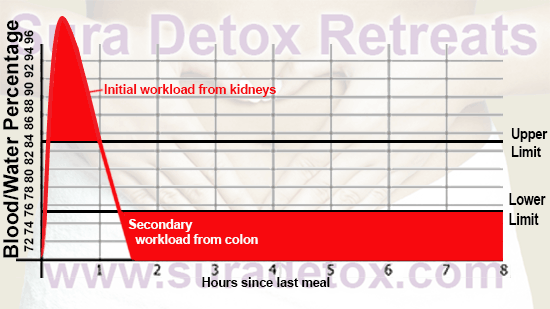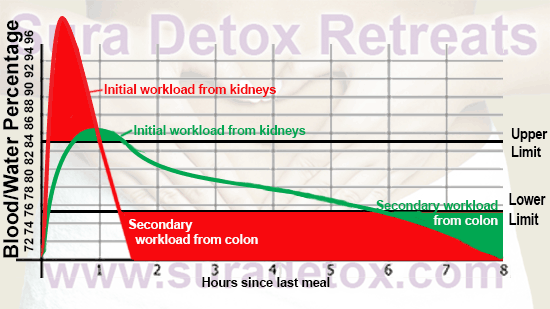How Important is Water?
Every system in the body requires water to function. We are all familiar with how much of us is made of water, but few understand that it is vital to keep it topped up, and running freely.
In this way it carries nutrients to cells, and metabolic toxins from the system. But how much, and how often, and where from ?
The Source of All Life
Water, like every other nutrient in the body needs to be regulated. As it forms such a large part of the blood, the kidneys have a lot of say over how much of it is in the system.
In their capacity as blood balancers, they will strip out anything in excess and deliver it to the bladder for elimination, even if it is required ten seconds later, it's too late, it's gone.
This is determined by the Hypothalamus gland at the back of the brain and fulfils a very complicated feedback loop which was, as usual, all set up and tweaked to perfection back in our days in the forest. This benign and plentiful environment showed no great need for water - or many other nutrients - as they were in such abundance everywhere we looked. So our body's flippant attitude to water, vitamins, minerals, etc., comes from a time of nutritional opulence - one that we do not live in today.
Staying Fluid
As always, the body has a back-up supply of water, designed as a reserve tank to keep us from death in the unlikely event of a shortage.
And as usual, we draw upon it constantly without really noticing, so we run at the lowest ebb possible before symptoms arise.
We advise a healthy admiration, attraction and consumption of water, long before it is necessary…
Don’t wait until you’re thirsty : If you didn’t pee in the last couple of hours, then drink !
Symptoms of Dehydration
Many dehydration symptoms are endemic, so get passed off for other things, and we usually find medical means of allaying them, or some other means of explaining them.
Chronic
If the system is forced to run on minimal for long periods, fluids start to thicken, and general tissue function falls...
Constipation
Kidney dysfunction
Lethargy
Dry skin
Weight problems
Circulation issues
Temporary
Without sufficient volume in the blood, it thickens, making it hard to drive this vital fluid into the smaller capiliaries, leading to...
Headaches
Dizzy, drowsy or tired
Dry mouth, lips and eyes
Concentrated, dark urine
Heart palpitations
Highs and Lows
For the blood to flow well, it needs to have MORE than the minimum amount of water content. Water can be drawn from other locations (primarily the colon) to make up the shortfall.
For the blood to deliver the appropriate amount of nutrients into cells, it must have LESS than the maximum amount of water present. Anything above this level, and the kidneys will strip out the excess.
Intracellular Fluids
When food is eaten in its native form (IE: the cells are whole), chewing breaks open some of the cells, delivering an initial burst of water into the system.
As this meal then goes through the digestive system, further cells are burst open, and a trickle of water continues to come from the food.
This is the flow rate that nature was expecting from the food entering the bowel.
Extracellular Fluids
When food is eaten in its cooked form (IE: the cells are smashed up), the initial burst of water is massive, as there is no cellular release into the system.
As this meal then goes through the digestive system, there are no further cells to burst open, so no more water comes from the food.
The current state of affairs is something new for the bowel to be dealing with, and the consequence is greater stress on the organs of regulation.
Comparison
A simple comparison between how much workload there is for the body between the plant material that contains inherent water, and that which has been cooked.
Before we start to look at major differences between the quality of the water, or how much of it is being consumed, we can already see a vast difference between how the body processes the two water sources.
As usual, it is all in the context.
What we can learn from this
Eating foods that have inherent water context - IE: they are raw and alive
Drinking fluids at regular intervals rather than all in one go
Consequences of dehydration
The primary effect of running the system without sufficient fluids for long periods will show up in the bowel.
As a major water source within the body, it can used as the above mentioned 'reservoir' from which to draw, to keep the blood levels within tolerance. However, this has a consequence, especially if done regularly.
Most people associate the word constipation to mean 'not going to the loo as often as normal', but this is a misnomer. The roots of this word are from the latin root 'constipar', which - more literally - means compressed - to press together.
As additional water is drawn from the bowel in order to fulfil the survival requirements of the blood, the material within becomes smaller, more sticky, harder, and more difficult to move. In short, it slows the bowel.
With our high-toxicity bowel contents in modern times, this is of growing consequence to the auto-intoxication of the body.
Additionally, if there is limited fluid for the lymph system to run on, then the blood's ability to track, neutralise and eliminate these toxic compounds is reduced, leaving them to build up in the blood - giving additional strain to the liver to remove them.







